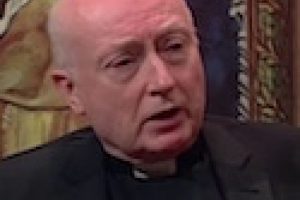Column: From the Pastor
To have known Father Stanley Jaki for more than twenty years was a privilege and a challenge. The privilege was to count as friend and mentor this Benedictine cited by many as one of the five priests whose science has most shaped our understanding of the world. The others are Copernicus in astronomy, Mendel in genetics, Mercalli in seismology, and Lemaitre in physics. The challenge was in being corrected often by this fiery Hungarian whose zeal in debate took no prisoners.
In my book Cloud of Witnesses, I mentioned how Jaki cautioned me against making the Big Bang theory into a theological statement. That was similar to the polite correction Georges Lemaitre made, on a higher plane, in 1951, when Pope Pius XII had implied that Lemaitre’s Big Bang proposition proved a Creator as well as Creation.
Einstein admired Lemaitre, and you might say that he was agnostic about agnosticism, observing cryptically: “If God created the world, his primary concern was certainly not to make its understanding easy for us.”
Einstein could be impatient with outright atheists: “The eternal mystery of the world is its comprehensibility.” He could not say more without compromising the limits of his own science.
Saint Augustine wrote: “We do not read in the Gospel that the Lord said, ‘I will send the Paraclete to teach you the course of the sun and the moon;’ in fact, He wanted to create Christians, not mathematicians.” Later, Cardinal Baronio, a spiritual disciple of Saint Philip Neri, epigrammed: “The Bible teaches us how to go to heaven, not how the heavens go.”
This applies to the enigmatic Shekhinah, or Glory of God, in the form of a cloud that accompanied the wandering Jews (Exodus 13:21) and appeared on Sinai (Exodus 24:16) and on Tabor (Matthew 17:5). Finally, it was seen at the Ascension. While this cloud could be perceived by human senses, it was beyond physical analysis. Here meteorology yields to another dimension for which there is no human definition other than acknowledgement of its existence. The Christian response moves beyond analysis to rejoicing. When Saint Paul spoke of a man who had experienced a “Third Heaven” (2 Corinthians 12:2) he could say no more than that.
I knew a woman who, Christmas caroling as a child, sang “Silent Night” outside Einstein’s house at 112 Mercer Street in Princeton. The Professor appeared on the porch with his violin and, while not singing the words, played the music.
In a sermon of 388, Gregory of Nyssa mentioned a special Feast of the Ascension to celebrate the Phos tou kosmou, the Light of the World. At the Ascension, the angel told the people not to gaze into the heavens, but to pray. Saint Paul would say: “When the Lord comes again, the living and the dead will be gathered in the clouds” (1 Thessalonians 4:16-17).
RELATED RESOURCES:
- BOOK: Cloud of Witnesses: Dead People I Knew When They Were Alive, by Fr. George W. Rutler
————————-
Fr. George W. Rutler, S.T.D., is a brilliant scholar, author, convert, former pastor of Our Saviour in Midtown Manhattan, the closest Catholic parish near the site of 9-11, and now pastor of St Michael’s parish in Hell’s Kitchen, New York City. A donation of any amount may be made to the parish at: www.StMichaelNYC.com.
View Articles Father Rutler was ordained to the diaconate in Rome by His Eminence William Cardinal Baum in 1980 and received priestly ordination in St. Patrick's... MORE »



You must be logged in to post a comment.